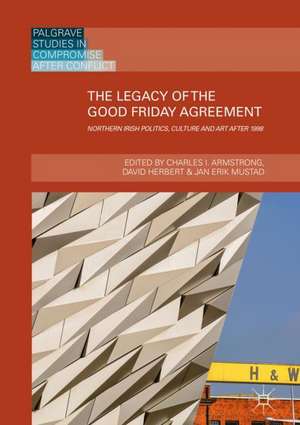The Legacy of the Good Friday Agreement: Northern Irish Politics, Culture and Art after 1998: Palgrave Studies in Compromise after Conflict
Editat de Charles I. Armstrong, David Herbert, Jan Erik Mustaden Limba Engleză Hardback – 18 sep 2018
| Toate formatele și edițiile | Preț | Express |
|---|---|---|
| Paperback (1) | 779.89 lei 6-8 săpt. | |
| Springer International Publishing – 10 ian 2019 | 779.89 lei 6-8 săpt. | |
| Hardback (1) | 789.83 lei 6-8 săpt. | |
| Springer International Publishing – 18 sep 2018 | 789.83 lei 6-8 săpt. |
Din seria Palgrave Studies in Compromise after Conflict
- 18%
 Preț: 727.80 lei
Preț: 727.80 lei -
 Preț: 332.14 lei
Preț: 332.14 lei -
 Preț: 380.63 lei
Preț: 380.63 lei -
 Preț: 387.75 lei
Preț: 387.75 lei - 15%
 Preț: 642.03 lei
Preț: 642.03 lei -
 Preț: 387.20 lei
Preț: 387.20 lei - 15%
 Preț: 640.06 lei
Preț: 640.06 lei - 18%
 Preț: 953.20 lei
Preț: 953.20 lei - 18%
 Preț: 783.50 lei
Preț: 783.50 lei - 18%
 Preț: 730.35 lei
Preț: 730.35 lei - 18%
 Preț: 730.65 lei
Preț: 730.65 lei - 15%
 Preț: 591.79 lei
Preț: 591.79 lei - 15%
 Preț: 527.79 lei
Preț: 527.79 lei - 15%
 Preț: 697.15 lei
Preț: 697.15 lei - 15%
 Preț: 528.13 lei
Preț: 528.13 lei - 15%
 Preț: 582.63 lei
Preț: 582.63 lei - 5%
 Preț: 1286.08 lei
Preț: 1286.08 lei - 15%
 Preț: 636.63 lei
Preț: 636.63 lei - 18%
 Preț: 783.50 lei
Preț: 783.50 lei - 15%
 Preț: 640.06 lei
Preț: 640.06 lei - 18%
 Preț: 725.61 lei
Preț: 725.61 lei -
 Preț: 319.81 lei
Preț: 319.81 lei - 15%
 Preț: 640.06 lei
Preț: 640.06 lei
Preț: 789.83 lei
Preț vechi: 963.21 lei
-18% Nou
Puncte Express: 1185
Preț estimativ în valută:
151.13€ • 157.79$ • 125.08£
151.13€ • 157.79$ • 125.08£
Carte tipărită la comandă
Livrare economică 04-18 aprilie
Preluare comenzi: 021 569.72.76
Specificații
ISBN-13: 9783319912318
ISBN-10: 3319912313
Pagini: 311
Ilustrații: XXI, 297 p. 11 illus. in color.
Dimensiuni: 148 x 210 x 27 mm
Greutate: 0.67 kg
Ediția:1st ed. 2019
Editura: Springer International Publishing
Colecția Palgrave Macmillan
Seria Palgrave Studies in Compromise after Conflict
Locul publicării:Cham, Switzerland
ISBN-10: 3319912313
Pagini: 311
Ilustrații: XXI, 297 p. 11 illus. in color.
Dimensiuni: 148 x 210 x 27 mm
Greutate: 0.67 kg
Ediția:1st ed. 2019
Editura: Springer International Publishing
Colecția Palgrave Macmillan
Seria Palgrave Studies in Compromise after Conflict
Locul publicării:Cham, Switzerland
Cuprins
1.Introduction.- 2.Eamonn O’Kane and Paul Dixon, ‘The Northern Irish Peace Process: Political Issues and Controversies’.- Part I The Will to Change: Key Players and Events.- 3.Paul Dixon, ‘Tony Blair’s Honourable Deception: In Defence of the “Dirty” Politics of the Northern Irish Peace Process’.- 4.Charles I. Armstrong, ‘”George Mitchell’s Peace”: The Good Friday Agreement in Colum McCann’s Novel TransAtlantic’.- 5.Jan Erik Mustad, ‘From Protest to Power: The Rise of the DUP’.- Part II Winners, Losers and Beyond the Zero Sum Game?.- 6.Stefanie Lehner, ‘Troubling Victims: Representing a New Politics of Victimhood in Northern Ireland on Stage and Screen’.- 7.Neil Jarman, ‘A Bitter Peace: Flag Protests, the Politics of No and Culture Wars’.- 8.Gladys Ganiel, ‘A Gender Balanced Approach to Transforming Cultures of Militarism in Northern Ireland’.- 9.Sissel Rosland, ‘Making Hope and History Rhyme? Dealing with Division and the Past in Northern Ireland after the Good Friday Agreement’.- Part III The Efficacy and Narratives of Culture.- 10.Seán Crosson, ‘The Shore (2011): Examining the Reconciliation Narrative in Post-Troubles Cinema’.- 11.Margaret Mills Harper, ‘Elementals in Language: Seamus Heaney after the Good Friday Agreement’.- 12.Anne Karhio, ‘Finished and Under Construction: Visual Representation and Spatial Relations in Post-Ceasefire Northern Irish Poetry’.- 13.Ruben Moi, ‘Post-Good Friday Positions and Parallaxes in Sinéad Morrissey’s Poetry’.- PART IV. THE FUTURE OF PEACE.- 14.David Herbert, ‘Legacies of 1998: What Kind of Social Peace Has Developed in Northern Ireland? Social Attitudes, Inequality and Territoriality’.- 15.John Brewer, ‘The Sociology of the Northern Irish Peace Process’.
Notă biografică
Charles I. Armstrong is a Professor of British literature at the University of Agder, Norway.
David Herbert is Professor of Sociology at Kingston University, UK, and Professor of Religious Studies at the University of Agder, Norway.
Jan Erik Mustad is Associate Professor in British Studies in the Department of Foreign Languages at the University of Agder, Norway.
Textul de pe ultima copertă
This book provides a multidisciplinary collection of essays that seek to explore the deeply problematic legacy of post-Agreement Northern Ireland. Thus, the authors of this book look at a number of issues that continue to stymie the development of a robust and sustainable peacebuilding project, including segregation, contested parades and flags, ethnic party mobilization, and memorialization. Towards addressing these contemporary issues, authors are drawn from a range of disciplines, including politics, history, literature, drama, cultural studies, sociology, and social psychology.
Charles I. Armstrong is a Professor of British literature at the University of Agder, Norway.
David Herbert is Professor of Sociology at Kingston University, UK, and Professor of Religious Studies at the University of Agder, Norway.
Jan Erik Mustad is Associate Professor in British Studies in the Department of Foreign Languages at theUniversity of Agder, Norway.
Caracteristici
Provides insights from a wide range of disciplines. Specifically focuses on Northern Ireland after the Good Friday agreement. Contains essays from leading contributors in the fields of politics, history, literature, drama, cultural studies, sociology and social psychology.
